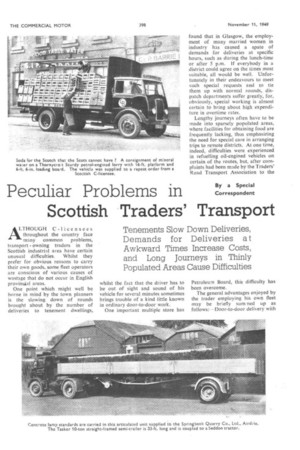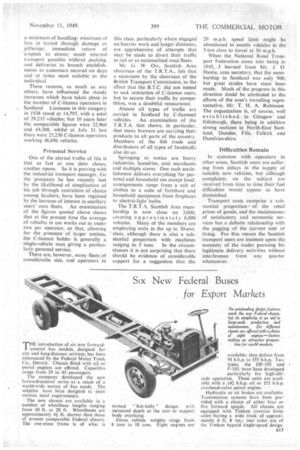Peculiar Problems in Scottish Traders' Transport
Page 100

Page 103

If you've noticed an error in this article please click here to report it so we can fix it.
Tenements Slow Down Deliveries, Demands for Deliveries at Awkward Times Increase Costs, and Long Journeys in Thinly Populated Areas Cause Difficulties
ATHOUGH C-licensees throughout the country face many common problems, transport owning traders in the Scottish industrial area have certain unusual difficulties. Whilst they prefer for obvious reasons to carry their own goods, some fleet operators are conscious of various causes of wastage that do not occur in English provincial areas.
One point which might well be borne in mind by the town planners is the slowing down of rounds brought about by the number of deliveries to tenement dwellings, whilst the fact that the driver has to be out of sight and sound of his vehicle for several minutes sometimes brings trouble of a kind little known in ordinary door-to-door work.
One important multiple store has found that in Glasgow, the employment of many married women in industry has caused a spate of demands for deliveries at specific hours, such as during the lunch-time or after 5 p.m. If everybody in a district could agree on the times most suitable, all would be well. Unfortunately in their endeavours to meet such special requests and to tie them up with normal rounds, dispatch departments suffer greatly, for, obviously, special working is almost certain to bring about high expenditure in overtime rates.
Lengthy journeys often have to be made into sparsely populated areas, where facilities for obtaining food are frequently lacking, thus emphasizing the need for special care in arranging trips to remote districts. At one time, indeed, difficulties were experienced in refuelling oil-engined vehicles on certain of the routes, but, after complaints had been made by the Traders' Road Transport Association to the Petroleum Board, this difficulty has been overcome.
The general advantages enjoyed by the trader employing his own fleet may be briefly sum ned up as follows: —Door-to-door delivery with
a minimum of handling; minimum of loss in transit through damage or _pilferage: immediate return of e.-ripties to stores; much internal transport possible without packing, and deliveries to branch establishments or customers secured on days and at times most suitable to the individual
These reasons, as much as any others, have influenced the steady increases which have taken place in the number of C-licence Operators in Scotland. Licensees in this category in 1938 stood at 14,797, with a total of 29,235 vehicles; but 10 years later the comparable figures were 22,960 and 44,388, whilst at July 31 last there were 25,230 C-licence operators working 48,696 vehicles.
Personal Service One ot the eternal truths of life is that as fast as one door closes, another opens. So it is proving with the industrial transport manager, for the prospects he has recently lost by the likelihood of simplication of his job through restriction of choice among hauliers, have been regained by the increase of interest in ancillary users' own fleets. An examination of the figures quoted above shows that at the present time the average of vehicles in use works out at under two per operator, so that, allowing for the presence of larger entities, the C-licence holder is generally a • single-vehicle man giving a particularly personal service.
• There are, however, many fleets of considerable size, and operators in this class, particularly where engaged on heavier work and longer distances, are apprehensive of attempts that may he made to divert their traffic to rail or to nationalized road fleets, Mr (I W Orr, &offish Area chairman • of the T.R.T.A., felt that a statement by the chairman of the British Transport Commission, to the effect that the B.T.C. did not intend to seek restriction of C-licence users, but to secure their traffic by competition, was a doubtful reassurance.
Almost all types of traffic are carried in Scotland by C-licensed vehicles. An examination of the T.R.T.A. lists shows, in particular, that many brewers are carrying their. products to all parts of the country. Members of the fish trade and distributors of all types of foodstuffs also do so.
Springing to notice are heavy industries, laundries, coal merchants and multiple stores One such establishment delivers everything for personal and household use except food: consignments range from a suit of clothes to a suite of furniture and household equipment from fireplaces to electric-light bulbs.
The T.R.T.A. Scottish Area membership is now close on 3,000, covering approximately 6,000 vehicles. Many of the members are employing units in the up to 30-cwt. class, although there is also a substantial proportion with machines
ranging to 5 tons. In the circumstances it is not surprising that there should be evidence of considerable support for a suggestion that the
20 m.p.h. speed limit might be abandoned to enable vehicles in the 5-ton class to travel at 30 m.p.h.
When the National Road Transport Federation came into being in 1945, learned from Mr. J. Hastie, area secretary, that the membership in Scotland was only 900, but great strides have since been made. Much of the progress in this direction dould be attributed to the efforts of the area's travelling representative, Mr. T. H. A. Robinson The organization is, of course, well established in Glasgow and -Edinburgh, there being in addition strong sections in North-East Scotland, Dundee, Fife, Falkirk and Dumfries-shire.
Difficulties Remain
In common with operators in other areas, Scottish users are suffering from delays in the supply of suitable new vehicles, but although complaints on the subject are received from time to time their fuel difficulties would appear to have diminished.
Transport costs comprise a substantial proportion of the retail prices of goods, and the maintenanco of satisfactory and economic services has a definite relationship with the pegging of the current cost of Living. For this reason the Scottish transport users are insistent upon the necessity of the trader pursuing his legitimate delivery activities without interference from any quarter whatsoever.
































































































































































































